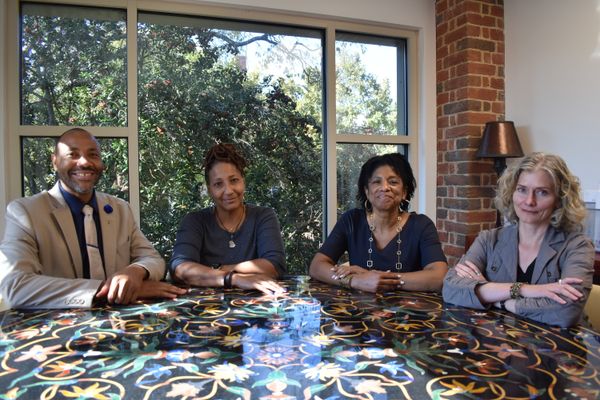This Fall, the Shared Equity Leadership Team (SELT) has been formed in place of a Vice President of Diversity, Equity, and Inclusion (DEI). The team consists of four Furman faculty and staff members who each bring DEI expertise: Robyn Andrews, Dr. Franklin Ellis, Dr. Cynthia King, and Dr. Lisa Knight. The team will strategize how to promote DEI in all areas of Furman’s campus and develop initiatives for assessing and improving DEI in the future.
In an interview with The Paladin, the team emphasized the excellence in DEI that already exists at Furman. When originally interviewing candidates for the position of Vice President of Diversity, Equity, and Inclusion, Ellis said in an SGA meeting that interviewees almost always commended his and other Furman leaders’ previous work in the field.
“We found we were being commended for the work we had already done,” he said.
The team highlighted how the shared leadership model allows them to utilize existing talent who are already knowledgeable about Furman in different areas, such as academic and student affairs.
The team said that a traditional VP role, the alternative to this model, would have been overwhelmed in trying to manage these dimensions. The team worked in an informal capacity last year and wanted to continue making progress in DEI, leading to its formal creation this year.
Several goals brought about the team's creation and have guided its work in DEI, including having a fresh, student-centric perspective on the work.
Robyn Andrews, the Libraries Circulation Supervisor and Diversity Coordinator and the Co-Chair of the President’s DEI Committee said, “We’re trying to incorporate not just looking top-down, but having a student-focused perspective.”
Another goal of the team is to promote a reunderstanding DEI to include a focus on accessibility, belonging, and mattering. In practice, the team strives to increase inclusivity in student organizations and faculty-staff relations.
Highlighting their unique contributions to the team, each member gave a response about how they focus on DEI at Furman.
Ellis, the Associate Dean and Director of the Center for Inclusive Communities and the Special Assistant to the President for Diversity and Belonging, emphasized the role of DEI in discourse.
“For me, it is the engagement of different ideas and how we do that. Can we talk about things that are critical and difficult, and can we do it in a way that centers people’s humanness?” he said.
King, the Associate Dean for Diversity, Equity, and Inclusive Excellence, added the importance of diverse representation on campus, saying, “Representation also matters, having diversity in all of its senses.”
Andrews corroborated her, saying, “We want to make sure that everyone feels comfortable, and doesn’t feel excluded by perceived inclusive measures. The feeling on campus, it means a lot.”
The team mentioned pre-existing programs and initiatives at Furman which will assist them in bringing their goals to fruition.
Introduced in October, the “On Discourse” Presidential Initiative will advertise events at Furman that develop skills in dealing with differences and disagreements. Additionally, DEI training and workshops exist for faculty, staff, and students, along with the Intergroup Dialogue, Dins Dialogue, and Pathways Programs which instrument conversations about identity around campus. The team lastly touched on the campus climate survey at Furman, which provides valuable data.
In beginning their work, the team added that they are aware of the increasing prevalence of laws restricting DEI in several states. Should restrictive laws be passed in South Carolina, their goal will be to anticipate their effects and strategize how to continue in their DEI efforts within this framework of legal parameters.
Students can get involved with the SELT team via the Bias Incidents Reporting System found on the University’s webpage, directly through email (dei@furman.edu), and by attending On Discourse programs, Dins Dialogue, and other on-campus opportunities.
King said that student feedback and participation in conversations surrounding DEI are invaluable to the team.
“Use your voice to claim an education. We want these student voices. Lay claim to it by being involved, by having your voice heard,” she said.
In staging difficult discourse, Ellis added that “there’s no growth in comfort and no comfort in growth, it is okay to lean into that discomfort.”
As for the future of the SELT team, Associate Dean King said, “We haven’t ruled out the possibility of a VP or CEO, this model will be in place for two years, and then we will reassess.”
